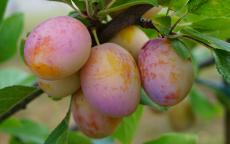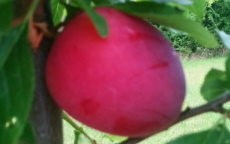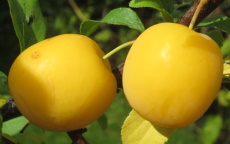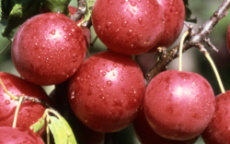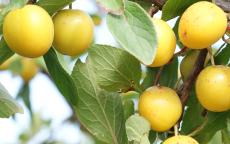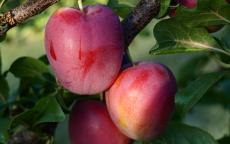Mirabelle trees
Mirabelles and Cherry Plums are both species of plum, mainly used in the kitchen. We can advise on all aspects of planting and growing them.
Golden Sphere
Golden Sphere is a large yellow Cherry Plum with a sweet plum-like flavour.£60.50 - £62.00buy- Picking season: Mid
- Self-fertility: Partially self-fertile
Mirabelle de Nancy
Mirabelle de Nancy is the definitive traditional French Mirabelle, originating from north-east France.£60.50 - £62.00buyBest seller- Picking season: Late
- Self-fertility: Partially self-fertile
How to choose Mirabelle trees
Mirabelles are a type of small sweet plum, a common sight in French markets in August. They can be eaten fresh, but are primarily used for making jams and similar preserves, as well as fruit tarts ('tarte aux mirabelles') and plum liqueurs. Mirabelles are the size of large cherries, and typically either bright red or golden yellow.
Mirabelles are usually classified as Prunus insititia, along with Damsons and Bullaces (although they are sweeter than these fruits), but are sometimes also classified as a variety of the common European Plum (Prunus domestica v. syriaca).
Cherry Plums are very similar to Mirabelles, but the fruits are a bit larger and they tend to ripen earlier in the summer.
Cherry Plums are usually categorised in a related species - Prunus cerasifera.
Regardless of the classification, Mirabelles and Cherry Plums make an interesting addition to the garden or orchard. They are hardy trees and grow well throughout Europe. Like the other minor plum species, they tend to have good disease resistance.
Mirabelles are partially self-fertile but will set a better crop if another mirabelle is planted nearby. Reflecting their close relationship, Mirabelles will also cross-pollinate with most European plums and damsons if they flower at the same time - they usually overlap with most early and mid-season blooming plums.
Cherry Plums are generally fully self-fertile, and flower very early in the spring. They will also cross-pollinate other plum varieties - usually only the earliest blooming - that are in flower at the same time.

